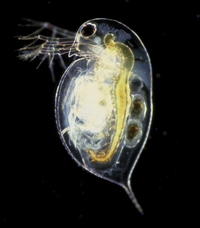
Variation of Tolerance to Isothiazolinones Among Daphnia pulex Clones
Sign Up to like & getrecommendations! Published in 2023 at "Environmental Toxicology and Chemistry"
DOI: 10.1002/etc.5564
Abstract: Isothiazolinones are a family of broad‐spectrum biocides widely used in industry and consumer products. Chloro‐ and methyl‐isothiazolinones (CMIT and MIT) are documented as strong irritants, yet they are still used in a wide variety of… read more here.
Keywords: cmit mit; daphnia pulex; variation tolerance; diversity ... See more keywords

Establishment of a high‐sensitivity reporter system in mammalian cells for detecting juvenoids using juvenile hormone receptors of Daphnia pulex
Sign Up to like & getrecommendations! Published in 2019 at "Journal of Applied Toxicology"
DOI: 10.1002/jat.3713
Abstract: Environmental waters are polluted by various chemicals originating from human activities. Recently, the environmental risk of juvenile hormones (JHs) to aquatic microcrustaceans has been recognized by risk assessors and researchers. JH is a major arthropod… read more here.
Keywords: reporter; receptors daphnia; risk; system ... See more keywords

Long-term changes in morphological traits of Daphnia pulex in Lake Fukami-ike, Japan
Sign Up to like & getrecommendations! Published in 2021 at "Limnology"
DOI: 10.1007/s10201-021-00659-x
Abstract: How a population adapts to environmental changes is a central topic in ecology, but long-term changes in the phenotype of an organism have rarely been studied in aquatic systems. In this study, we examined the… read more here.
Keywords: fukami ike; lake fukami; daphnia pulex; term changes ... See more keywords

Combined effects of the pesticide spinetoram and the cyanobacterium Microcystis on the water flea Daphnia pulex
Sign Up to like & getrecommendations! Published in 2022 at "Environmental Science and Pollution Research"
DOI: 10.1007/s11356-022-18617-0
Abstract: Spinetoram is one of the most worldwidely used pesticides for its high insecticidal efficacy and low human toxicity. Following the large usage of spinetoram, the ecotoxicity and environmental risks to aquatic ecosystems have call for… read more here.
Keywords: daphnia pulex; microcystis; combined effects; pesticide spinetoram ... See more keywords

Variation in transcriptional responses to copper exposure across Daphnia pulex lineages.
Sign Up to like & getrecommendations! Published in 2019 at "Aquatic toxicology"
DOI: 10.1016/j.aquatox.2019.02.016
Abstract: Copper pollution is pervasive in aquatic habitats and is particularly harmful to invertebrates sensitive to environmental changes such as Daphnia pulex. Mechanisms of toxicity and tolerance to copper are not well understood. We used RNA-sequencing… read more here.
Keywords: pulex lineages; exposure; copper; daphnia pulex ... See more keywords

Transcriptional response provides insights into the effect of chronic polystyrene nanoplastic exposure on Daphnia pulex.
Sign Up to like & getrecommendations! Published in 2019 at "Chemosphere"
DOI: 10.1016/j.chemosphere.2019.124563
Abstract: Nanoplastic pollution is widespread and persistent across global water systems and can cause a negative effect on aquatic organisms, especially the zooplankter which is the keystone of the food chain. The present study uses RNA… read more here.
Keywords: nanoplastic exposure; exposure; daphnia pulex; effect chronic ... See more keywords

Models for the acute and chronic aqueous toxicity of vanadium to Daphnia pulex under a range of surface water chemistry conditions.
Sign Up to like & getrecommendations! Published in 2019 at "Ecotoxicology and environmental safety"
DOI: 10.1016/j.ecoenv.2019.04.052
Abstract: Alberta's oil sands petroleum coke (PC) generation has in recent years surpassed 10 million tonnes. Petroleum coke has been proposed as an industrial-scale sorbent to reduce concentrations of organic chemicals in oil sands process-affected water… read more here.
Keywords: surface water; sulphate; chemistry; daphnia pulex ... See more keywords

Temperature-related differences in mitochondrial function among clones of the cladoceran Daphnia pulex.
Sign Up to like & getrecommendations! Published in 2017 at "Journal of thermal biology"
DOI: 10.1016/j.jtherbio.2017.05.005
Abstract: This study assessed the thermal sensitivity of mitochondrial respiration in the small crustacean Daphnia pulex. More specifically, we wanted to determine if clones that inhabit different latitudes and habitats showed differences in the thermal sensitivity… read more here.
Keywords: temperature; mitochondrial function; respiration; daphnia pulex ... See more keywords

The dynamics of cadmium acclimation in Daphnia pulex: Linking fitness costs, cross-tolerance and hyper-induction of metallothionein.
Sign Up to like & getrecommendations! Published in 2019 at "Environmental science & technology"
DOI: 10.1021/acs.est.9b05006
Abstract: Acclimation increases tolerance to stress in individuals but is assumed to contribute fitness costs when the stressor is absent, though data supporting this widely held claim are sparse. Therefore, using clonal (i.e., genetically identical) cultures… read more here.
Keywords: tolerance; acclimation; fitness costs; daphnia pulex ... See more keywords

The Linkage-Disequilibrium and Recombinational Landscape in Daphnia pulex
Sign Up to like & getrecommendations! Published in 2022 at "Genome Biology and Evolution"
DOI: 10.1093/gbe/evac145
Abstract: Abstract By revealing the influence of recombinational activity beyond what can be achieved with controlled crosses, measures of linkage disequilibrium (LD) in natural populations provide a powerful means of defining the recombinational landscape within which… read more here.
Keywords: recombination; linkage disequilibrium; daphnia pulex; recombinational landscape ... See more keywords

Genetic Variation in Reproductive Investment Across an Ephemerality Gradient in Daphnia pulex
Sign Up to like & getrecommendations! Published in 2022 at "Molecular Biology and Evolution"
DOI: 10.1093/molbev/msac121
Abstract: Abstract Species across the tree of life can switch between asexual and sexual reproduction. In facultatively sexual species, the ability to switch between reproductive modes is often environmentally dependent and subject to local adaptation. However,… read more here.
Keywords: variation reproductive; genetic variation; daphnia pulex; variation ... See more keywords